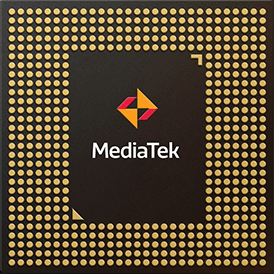
MediaTek MT6580 Benchmark, Test and specs
Last updated:
The MediaTek MT6580 has 4 CPU cores and can process 4 threads at the same time. The processor was presented in 2015 and is based on the 1. Generation of the Mediatek MT-Serie series. In the Geekbench 5 benchmark, the MediaTek MT6580 achieved a result of 67 points (single-core) or 211 points (multi-core).

| Name: | MediaTek MT6580 |
|---|---|
| Family: | Mediatek MT-Serie (72) |
| CPU group: | MediaTek MT65xx A7 (14) |
| Architecture: | Cortex-A9 |
| Segment: | Mobile |
| Generation: | 1 |
| Predecessor: | -- |
| Successor: | -- |
CPU Cores and Base Frequency
The MediaTek MT6580 has 4 cores. The clock frequency of the MediaTek MT6580 is 1.30 GHz. An initial performance assessment can be made using the number of CPU cores.
| CPU Cores / Threads: | 4 / 4 |
|---|---|
| Core architecture: | normal |
| Cores: | 4x Cortex-A7 |
| Hyperthreading / SMT: | No |
|---|---|
| Overclocking: | No |
| Frequency: | 1.30 GHz |
| Turbo Frequency (1 Core): | -- |
| Turbo Frequency (4 Cores): | -- |
Internal Graphics
The MediaTek MT6580 has an integrated graphics that the system can use to efficiently play back videos. The MediaTek MT6580 has the ARM Mali-400 installed, which has 1 streaming multiprocessors (16 shaders).
| GPU name: | ARM Mali-400 |
|---|---|
| GPU frequency: | 0.40 GHz |
| GPU (Turbo): | 0.40 GHz |
| Compute units: | 1 |
| Shader: | 16 |
| Hardware Raytracing: | No |
| Release date: | Q2/2008 |
| Max. displays: | 1 |
|---|---|
| Generation: | Utgard |
| Direct X: | 0 |
| Technology: | 28nm |
| Max. GPU Memory: | -- |
| Frame Generation: | No |
Memory & PCIeThe MediaTek MT6580 supports a maximum of memory. Depending on the mainboard, the processor can use a maximum of 1 (Single Channel) memory channels. This results in a maximum bandwidth of the main memory of 4.3 GB/s. |
|
| Memory type: | Memory bandwidth: |
|---|---|
| LPDDR3-533 LPDDR2-533 | 4.3 GB/s 4.3 GB/s |
| Max. Memory: | |
| Memory channels: | 1 (Single Channel) |
| ECC: | No |
| PCIe: | |
| PCIe Bandwidth: | -- |
Thermal ManagementThe MediaTek MT6580 has a TDP of . Based on the TDP, the system manufacturer can and must adapt the cooling solution to the processor. |
|
|---|---|
| TDP (PL1 / PBP): | |
| TDP (PL2): | -- |
| TDP up: | -- |
| TDP down: | -- |
| Tjunction max.: | -- |
Technical details
Modern production reduces the waste heat of a processor and increases its efficiency. The MediaTek MT6580 is made in 28 nm and has 0.00 MB cache.
| Technology: | 28 nm |
|---|---|
| Chip design: | Chiplet |
| Socket: | -- |
| L2-Cache: | -- |
| L3-Cache: | -- |
| AES-NI: | No |
| Operating systems: | Android |
| Virtualization: | None |
|---|---|
| Instruction set (ISA): | Armv7-A (32 bit) |
| ISA extensions: | -- |
| Release date: | 2015 |
| Release price: | -- |
| Part Number: | -- |
| Documents: | Technical data sheet |
Rate this processor
Benchmark results

The benchmark results for the MediaTek MT6580 have been carefully checked by us. We only publish benchmark results that have been created by us or that have been submitted by a visitor and then checked by a team member. All results are based on and fullfill our benchmark guidelines.
Geekbench 5, 64bit (Single-Core)
Geekbench 5 is a cross plattform benchmark that heavily uses the systems memory. A fast memory will push the result a lot. The single-core test only uses one CPU core, the amount of cores or hyperthreading ability doesn't count.

|
MediaTek MT8321
4C 4T @ 1.30 GHz |
||

|
MediaTek MT8125
4C 4T @ 1.20 GHz |
||

|
MediaTek MT6735M
4C 4T @ 1.00 GHz |
||

|
MediaTek MT6735P
4C 4T @ 1.00 GHz |
||

|
MediaTek MT8752
8C 8T @ 1.70 GHz |
||
|
|
MediaTek MT6580
4C 4T @ 1.30 GHz |
||

|
Qualcomm Snapdragon 210
4C 4T @ 1.10 GHz |
||
Geekbench 5, 64bit (Multi-Core)
Geekbench 5 is a cross plattform benchmark that heavily uses the systems memory. A fast memory will push the result a lot. The multi-core test involves all CPU cores and taks a big advantage of hyperthreading.

|
Intel Celeron 430
1C 1T @ 1.80 GHz |
||

|
AMD E1-1500
2C 2T @ 1.48 GHz |
||

|
AMD E-450
2C 2T @ 1.65 GHz |
||
|
|
MediaTek MT6580
4C 4T @ 1.30 GHz |
||

|
Intel Atom D2500
2C 2T @ 1.86 GHz |
||

|
Intel Atom Z3735E
4C 4T @ 1.83 GHz |
||

|
AMD C-60
2C 2T @ 1.33 GHz |
||
iGPU - FP32 Performance (Single-precision GFLOPS)
The theoretical computing performance of the internal graphics unit of the processor with simple accuracy (32 bit) in GFLOPS. GFLOPS indicates how many billion floating point operations the iGPU can perform per second.

|
MediaTek MT8317
PowerVR SGX531 @ 0.52 GHz |
||

|
Intel Core Ultra 5 125H
Intel Iris Xe 7 Core Graphics 112 EUs (Meteor Lake) @ 2.20 GHz |
||

|
Intel Core Ultra 5 125HL
Intel Iris Xe 7 Core Graphics 112 EUs (Meteor Lake) @ 2.20 GHz |
||
|
|
MediaTek MT6580
ARM Mali-400 @ 0.40 GHz |
||

|
MediaTek MT6572M
ARM Mali-400 @ 0.40 GHz |
||

|
Samsung Exynos 3110
PowerVR SGX540 @ 0.20 GHz |
||

|
MediaTek MT6575M
PowerVR SGX531 @ 0.28 GHz |
||
Benchmarks
Popular comparisons
back to index












